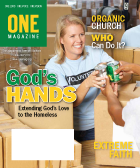
June-July 2013
God's Hands
------------------
|

Organic Church
by Timothy York
A once-familiar word has experienced resurgence. It is the decade’s biggest culinary buzzword and a platform talking point for the “go green” subculture. It is the word organic. Organic food really became mainstream in 2002 when the USDA released standards defining what would constitute organic food. Over the next seven years, it exploded to a global sales total of $54 billion.
The concept of “organic food” is simple. Eat uncontaminated food “the way nature intended.” This culinary phenomenon serves as a great illustration of how God intended for the church to minister to one another and to the outside world. The church world today is full of strategists who endorse their model of lay ministry within the church. Unfortunately, many plans lack the most basic element—the organic desire to do it.
Peter reminded readers that, “Every man hath received the gift, even so minister the same one to another” (1 Peter 4:10). Before church strategists and think-tanks came along, the church survived century after century by simply living out her faith in small communities of people who cared about God, each other, and the fallen world around them. This biblical model of ministry (including lay ministry) seems almost too simple, but isn’t that how God typically works (Matthew 18:3; 1 Corinthians 3:19)?
In Acts 2, where it all began, a short but effective glimpse into the thoughts and actions of the first-generation church is given. We understand that these individuals heard the Word being preached by Peter and responded in faith. However, verses 42-47 catalog the actions of these infant believers as they lived in daily communion with each other and with God.
Now, I’m not suggesting we all buy land and start Free Will Baptist “communes,” but it does seem that the lives of the members of the Early Church were much more intertwined than today’s average American congregation. In fact, Barna Research Group states, “Twenty-three percent of adults with church experience say that church feels like a group of people sharing the same space in a public event but who are not connected in a real way.”
No wonder the Lord is not adding to our church daily. We are missing the most “organic” pieces of the puzzle. In Matthew 5:46, Jesus taught us to love our enemy because even the lowest members of society love those who love them in return. What is the implication when we, as the church, cannot connect with our enemies, because we cannot even connect with those with whom we worship?
All of this became very real to me a few months ago. For the past year, our church has focused on small group ministry. We strive to generate a true, biblical community. As is typical, life became extremely difficult for one member of our community, and he abandoned the church and ignored our invitations to return. However, we witnessed a handful of infant believers as they did what they could to bring the missing member back to our community.
Organic ministry. Without even knowing the biblical expectations, these infant believers began ministering to each other because that is what a true community does. Organic ministry, “The way God intended it.”
About the Writer: Timothy and Amanda York are an integral part of the Buffalo home missions team ministering in New York. Learn more: www.northpointbuffalo.com
|
|

